Feb 1, 2018
by Stephanie Oelsligle Jordan, Sustainable Solano, Local Food System Manager
This was my first EcoFarm conference. When initially sifting through the options for lectures and discussions about a month ago, I noticed the obvious: “how-to” workshops on various technicalities of farming, and peer discussions on what works (or doesn’t) in agriculture today, new inventions, pest management, etc. What I wasn’t expecting were some amazing and relevant discussions and speeches addressing how today’s farmers must intersect with larger social/world issues including hunger, social justice in food systems, honoring Native American lands, and climate change, just to name a few.
But there was another underlying, somewhat spiritual theme that seemed to arise from the workshops and discussions that I attended: our relationship to – and responsibility for – a given place, whether we farm it or not. It was this “sense of place” that I found myself thinking about the most, and how that idea might serve my work with Sustainable Solano’s Local Food initiatives.
I am not an expert in Permaculture or Biodynamic farming (I’m a chef!) but I gathered that this “sense of place” is vitally important in both methods of farming. In a talk titled “Nature Connection, Permaculture & Ecological Responsibility,” Will Scott of Sonoma’s Weaving Earth Center for Relational Education took us on a journey both inside our minds and hearts, and then – literally – out into the woods. His initial argument was that “our sense of awareness of our landscape and surroundings has been limited by the industrialized world….The mind has been colonized, and the story of separation has been ingrained….Modern experience has atrophied our ‘whole being sense.’” But all is not lost!
Through “Nature Connection,” we can regain our sense of connection. He made an interesting point (often forgotten, I might add) that our connection to the natural world just IS. We can’t deepen it. However, we can increase our capacity to interact with it and relate to it. “When love for a place happens,” he stated, “empathy is embodied and behavior can change to ensure the place is taken care of….If we want to start designing or thinking ‘whole system’, then we need to use our whole system too: heart and mind, and not just our intelligence.” He had a quote from someone else, which pretty much summed it up: “Lose your mind and come back to your senses!” So we did. He led us out to the woods, and for about 10 minutes we did nothing but let nature interact with our 5 senses, in what he called a “Sit Spot.”
Another workshop that touched upon this “sense of place” was a discussion group titled “Biodynamic Farming and Gardening for the Future”. Seasoned biodynamic farmers and newcomers to the method were sitting in a circle, and I was struck by one farmer who had previously farmed in Wisconsin. He had lately moved to California, and just wasn’t connecting to the land like he had in the Midwest. (This is a problem, by the way, if you want to be a biodynamic farmer!) As I learned about the importance of the farmer’s interaction with not only the land, but also the solar system, weather patterns, creatures big and small, and everything else in his/her “place,” I began to wonder about the rest of us. Is there a way to connect non-farmers to the land/place through the food?
This question also came up for me at a couple of workshops on Community Supported Agriculture (CSA) programs. As you’d guess, the CSA discussions were largely about how to acquire and retain subscriptions. After addressing the logistical issues (marketing, surveys, packaging, software, etc.), the group concluded that 1) education about CSAs was important and 2) people want a connection to local farmers. Here’s that connection theme again!
The final talk I attended was titled “The Farmer and the Chef: Utilizing Abundance” (Finally! Something I understand!) and featured exactly that: Farmer Jeff Dawson of The Farm in Woodside, CA and Chef Stuart Brioza of State Bird Provisions and The Progress restaurants in San Francisco. Here they were, presenting their collaboration, along with all the spreadsheets and systems that have made it work over the past 5 years. This is admittedly a very specialized relationship, in which the majority of us will not experience. However, Chef Brioza made a good point, which is not unlike the CSA programs, and has this idea of connection at heart: “You’re not just partnering with a farm. You’re partnering with abundance, and the harvest….We are telling a story about the farm, on the plate.”
I’m sure I left EcoFarm with more questions than answers. (How can the larger population become involved in that “sense of place” in order to appreciate the value of the farmer’s work? How can this “sense of place” influence our local farmers to take better care of their soil? How are we ALL responsible for this place, whether we farm it or not?) And I think most of the attendees may have left with more questions as well. However, I sensed an energy among all of us that in the midst of all the questions, we all had an unwritten and unspoken commitment to one another to move forward. Everyone seemed courageous….ready to make connections….and do what it takes to care for their respective places on the planet.
Made possible by Solano Public Health in partnership with the Yocha Dehe Wintun Nation
Nov 30, 2017
Starting this past October, Veronica Bearce, Susan Neuhaus, and Annette Batchelor have been managing the Community Supported Agriculture (CSA) program in Benicia. If you pick up farm-fresh food on Wednesdays at Heritage Presbyterian Church, say THANK YOU to these amazing women! Their commitment of time and energy has made it easier for folks in Benicia to get high-quality products from surrounding farms and fisheries. Sustainable Solano is very grateful for their involvement in this project.
if you would like to implement a similar program in your town, contact Stephanie Jordan, our Local Food Program Manager at stephanie@sustainablesolano.org
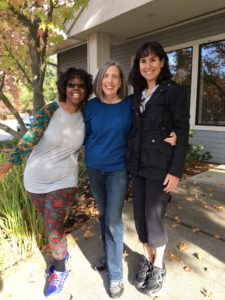
Nov 1, 2017
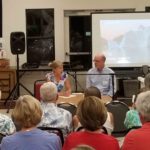
By Stephanie Oeslgigie Jordan, Project Manager, Chef
Can a community decide how it will access food for its members? Is there democratic participation in our food system? What mindsets frame the future of our local food systems? These questions and more kicked off a fascinating lecture-discussion led by Dr. Gail Feenstra and Dr. David Campbell of UC Davis on October 25. Coordinated by Sustainable Solano, the talk was part of an ongoing program hosted by Heritage Presbyterian Church in Benicia, titled “How to Make the World a Better Place,” which features presentations and learning opportunities for people of all ages in Benicia.
Structured as an interview akin to Terry Gross’ “Fresh Air” program on NPR, Drs. Feenstra and Campbell asked provocative questions to each other, to get at the heart of issues surrounding local food systems. The idea of “Local Food” has grown exponentially in the last couple of decades. Dr. Campbell pointed out that in 1997, he and his research team could find only 100 articles on local food, and in 2011 there were over 2000 articles! (In fact, the USDA LFPP grant that Sustainable Solano was awarded didn’t exist 10 years ago.) So, what is all the fuss about? Communities are becoming increasingly interested in how food will be produced, distributed and sold. Over the years, competitive grants programs began to pop up (i.e. Placer Grown, Solano Grown) along with other programs that help communities start businesses and projects that assist local farmers/growers.
When running a food project, Dr. Feenstra had 3 important tips for success (she called them the “3 Ps”): 1) Partnerships are key, and the more diverse your partnerships, the better; 2) Public Participation is necessary for a solid community base and the development of leaders; and 3) maintaining high Principles & Values will help projects achieve social and environmental justice.
Sounds easy, right? Well….there are some challenges according to Dr. Campbell, when asked about planning future food systems. There are 3 different frames of mind out there, each with a different focus. The first is driven by the question, “How are we going to feed 9 billion people?” This perspective is driven by the idea that we need “more”, and incorporates the latest farming technology to increase volume and production. The second group has an environmental focus, driven by climate change. A local example includes the fact that crops are changing location in California, due to increased heat, drought, and changing weather patterns. (We might add that sustainable vs. unsustainable farming methods would affect this problem as well.) The third group is focused on social justice, asking “Why doesn’t everyone have access to healthy food?” and “Who is really running the elements of our food system?”
Not surprisingly, the solution lies in the need for these 3 frames to work together, instead of compete for attention. But how? Dr. Campbell suggests that local communities have advantages of doing work that integrates these elements. Referencing Daniel Kemmis’ book, Community and the Politics of Place, Dr. Campbell theorizes that it is this common love of place that can serve as a foundation to bring people together and allow communities to better tackle issues and develop their own systems. At the same time, communities must have peripheral vision – they must learn to see what’s around them, and develop diverse partnerships with people who can contribute their own unique experiences. If you are too local, you will fight the symptoms, but not the root cause.
And remember those 2000 articles that now exist on local food systems? All that research has illuminated three challenges, which communities must keep in mind: 1) Economic challenges which dance between paying the farmer enough money (so that he/she can continue farming), yet making food affordable for everyone, 2) Social challenges, addressed by numerous studies showing how middle- and upper-class white people are the only ones who can afford healthy food, and 3) Political challenges which highlight the lack of cooperation between one side of the food movement which wants to make changes within, and the other side which wants to “blow up” the system and start something entirely new.
In spite of all these challenges, Dr. Campbell subscribes to what he calls “hopeful realism.” The talk finished with a video of a UC Davis urban agriculture project, where youth work at a community garden in Oakland. Instead of having the director of the program lead a tour through the garden, UC Davis asked the youth to talk about their experiences and knowledge while the camera rolled. At the end of the video, teens and youth were using words such as “love” and “happy” to describe how they felt about their work in the garden. When diverse groups of participants come together and cooperate to solve issues, everyone has the opportunity to benefit in some way.
About the speakers:
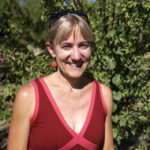 Gail Feenstra is the Deputy Director of the Sustainable Agriculture Research and Education Program (SAREP), a program of the Agricultural Sustainability Institute at UC Davis and the UC Division of Agriculture and Natural Resources (ANR). For Dr. Feenstra’s full biography, click here.
Gail Feenstra is the Deputy Director of the Sustainable Agriculture Research and Education Program (SAREP), a program of the Agricultural Sustainability Institute at UC Davis and the UC Division of Agriculture and Natural Resources (ANR). For Dr. Feenstra’s full biography, click here.
http://asi.ucdavis.edu/people/Feenstra
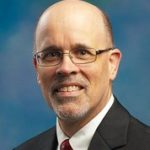 David Campbell, a political scientist, is Associate Dean for social/human sciences in the College of Agricultural and Environmental Sciences at UC Davis. He was appointed Associate Dean in October 2014. For Dr. Campbell’s full biography, click here.
David Campbell, a political scientist, is Associate Dean for social/human sciences in the College of Agricultural and Environmental Sciences at UC Davis. He was appointed Associate Dean in October 2014. For Dr. Campbell’s full biography, click here.
http://www.caes.ucdavis.edu/about/directory/fsd/david-campbell
Nov 1, 2017
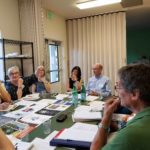
By Stephanie Oesligie Jordan, Project Manager, Chef
On October 25, Sustainable Solano kicked off it’s “Solano Community Food Centers” planning grant – funded by USDA -with an Advisory Board meeting in Benicia, CA.
Attending the meeting were an enthusiastic group representing UC Davis and Solano County, as well as Solano County farmers and community leaders. Board members discussed what aspect of the project each of them could help with, and where their individual expertise could bring goals to fruition. The first phase of the planning grant includes a feasibility study, which will begin with data collection and analysis. As we work through phase 1, we aim to have a clearer picture of Solano County’s local food supply, its existing distribution systems, and an analysis of historical sales data. To this end, Dr. Kristin Kiesel of UC Davis gave a brief presentation on the proposed structure of the feasibility study, and the types of data needed to achieve our goals.
Thanks again to our Advisory Board members! Sustainable Solano is grateful for everyone’s participation and willingness to volunteer their time and talents!
ADVISORY BOARD:
David Campbell, Associate Dean, Social and Human Sciences, UC Davis
Robin Cox, Sr. Health Services Manager, Solano Public Health
Gail Feenstra, Deputy Director SAREP, UC Davis
Simone Hardy, Agricultural Commissioner, Solano County
Mike Ioakimedes, Business Development Manager, Solano County Fairgrounds
Kristin Kiesel, Lecturer PSOE, Agricultural & Resource Economics Dept, UC Davis
Wendy Loomas, Health Services Manager, Solano Public Health
Ben Lyons, Farmer, Lockewood Acres
Denise Lyons, Farmer + Criminalist Supervisor, Solano County DA
Jahniah McGill, Environmental Health Supervisor, Solano County
Greg Morrison, Board Member, Cultivate Community Food Co-Op
Stann Whipple, Treasurer, Board of Directors, Sustainable Solano
Wendy Rash, District Conservationist for the Vacaville Service Center, USDA-NRCS
Sarah Hawkins, Solano County Farmbudsman
For more information on Sustainable Solano’s USDA LFPP grant, click here.
Oct 4, 2017
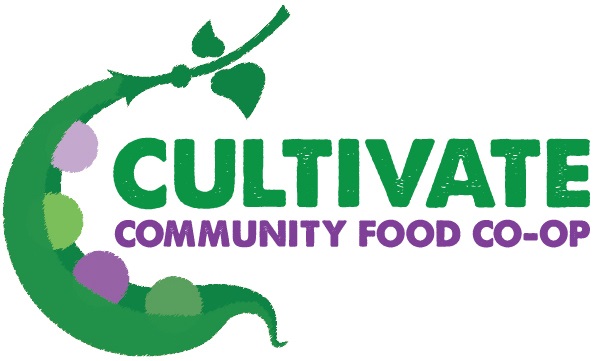
By Cultivate Community Food Cooperative
The experts say it will take a startup food co-op about 3-5 yrs. to open a food co-op grocery store. Well if that is true, then Cultivate Community Food Co-op is right on course. After 18 months of Stage I development – Organizing, CCFC reached Stage II development – Feasibility and Planning, in July, when we filed our Articles of Incorporation.
In September we had an Incorporation party and sold 25 owner shares, (soon we will be selling owner shares online.) Which brings us to October, which just happens to be ‘Co-op month’. Co-op month has been celebrated annually in October across the United States for more than half a century. It is a time for cooperative businesses to reflect on their shared principles and to educate others about the value of belonging to a cooperative.
In doing our part, Cultivate Community Food Co-op will be joining Sustainable Solano in a panel discussion entitled, ‘How to Make the World Better’, on Wed. Oct. 25 at the Heritage Presbyterian Church in Benicia. CCFC’s founder, Paula Schnese, will share with the community the progress the food co-op has made, talk about our future goals and timelines, and answer questions from the audience. In addition to this educational event, during Co-op month, CCFC will
also be sharing information at some of the local farmers markets and at the Loma Vista Farm Harvest Festival on October 21st .
Become an owner of your local food co-op! We will be selling owner shares at all the events we attend! ��
Our Collective Goals
To create a sustainable grocery business based on member ownership and democratic decision-making
To support local producers and sustainable agriculture
To provide health-enhancing foods
To keep prices as low as possible
To be fair and supportive to our employees and to be sensitive to the working and living
conditions of those who make what we sell
To be a community resource that helps the people of Benicia and Vallejo lead healthier lives
To be a place in the community where people can come to gather and create community
To be good stewards of the environment through conscientious, sustainable use of resources
To reach out to low-income members of the community and enable their participation.
To welcome all.
Our Mission
Cultivate Community Food Co-op will be Solano County’s first community-owned, natural grocery store. We will be a one stop, brick and mortar grocer dedicated to providing high-quality, locally-sourced, culturally-relevant, ethically-produced and affordable products.
Offering health and wellness education, we aim to empower our community and provide a public meeting space to engage with others. We are committed to creating and maintaining a more sustainable economy with a just and equitable future for our farmers, artisans, employees and owners by decreasing the physical and social distance between producers and consumers.
Cultivate Community Food Cooperative, Inc. (CCFC) is a cooperative corporation organized under the Consumer Cooperative Corporation Law of California
Become an Owner of CCFC: Owners in good standing may vote in co-op elections, attend the Annual Meeting, and run for the Board of Directors.
Other benefits include:
Coupons, Sales and Discount Days
Case Discounts on Special Orders
Patronage Refund
Discounted Classes
Select a Plan: Online sales will be available on our website soon
Full Fair Share*: Invest $300
Strongly encouraged to facilitate store opening
Partial Share*: Invest $25
Now and every quarter (or more often) until the full Fair Share of $300 is reached
*A $5 processing fee is charged (this helps with the cost of creating membership cards)
Contact Us:
E-mail: info@cultivatecommunityfood.coop
Website: http://cultivatecommunityfood.coop/
Facebook Page: https://www.facebook.com/cultivatecommunityfood.coop/
Mailing address: P.O. Box 94, Benicia, CA 94510
Oct 4, 2017
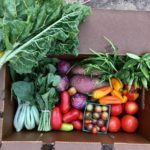
A community supported agriculture box from Eatwell Farm.
As we move forward with our greater vision for our Local Food Movement Initiative, we aim to better connect area farmers to the people of Solano County. Eating locally and supporting our local food growers strengthens our regional food system by building community and keeping dollars in our own local economy.
There is also a significant environmental impact of local food production-distribution networks which provide a shorter distribution distance between the grower and consumer. Generally, farm products are processed directly on the farm itself reducing middle-man packaging and additional refrigerated trucking. With smaller, sustainable family farms, you can count on fresher produce, a greater variety of seasonal fruits and vegetables, and endless learning opportunities! Many farms offering Community Supported Agriculture (CSA) box programs offer tours where you can meet your farmers directly and see how your food is grown.
Supporting local food growers through a direct-to-consumer CSA program allows customers to enjoy highly-nutritious produce, meats, dairy and other farm goods. Members can pick up harvest shares at a communal location or have them delivered directly.
Sustainable Solano has made it easy for you to start eating fresher, better foods by compiling a list of local CSAs that currently deliver directly to Solano County cities. Communal pick-up locations are established when the minimum number of memberships required by each farm is met in each city. The more friends and family sign up, the more convenient pick-up locations are created in your city.
Don’t miss out on these current promotional specials!
Lockewood Acres
7781 Locke Road, Vacaville| ben@lockewoodacres.com (707) 624-0831
- Organic farm providing vegetables, fruit, eggs, meat and honey to Vacaville and surrounding areas.
Siren Fish Company
info@sirenfish.com | (707) 925 FISH
- Providing sustainably harvested California seafood
- Use code: solano for $15 off your sign-up fee!
Terra Firma Farm
P.O. Box 836, Winters | csa@terrafirmafarm.com | (530) 795-2473
- Certified organic year-round vegetables, fruits and nuts grown locally in Solano and Yolo County
Real Food Bay Area
support@realfoodbayarea.com | (408) 835-9353
- Providing healthy, nutrient dense, sustainable, fresh and prepared foods.
Tara Firma Farm
3769 I Street Ext., Petaluma | (707-)765-1202
- Pasture raised beef, pork, chicken, lamb, and turkey. Organic fruit, eggs, cheese, and vegetables.
- Mention Sustainable Solano and receive one pound of FREE bacon! If ordering online, call following your order to apply.
Eatwell Farm
5835 Sievers Road, Dixon | organic@eatwell.com | (707) 999-1150
- High-quality, fresh produce, dairy and other specialty goods
Azure
(707) 971-200-8350
- Natural and organic food distributer delivering more than 14,000 non-GMO and organic local and non-local products direct to families.
Our goal is to include all Solano County food producers on this list so please share with us any we missed so we can add it to our website and start providing our residents more options for healthy, local food!
Big News for Benicia’s CSAs!
Benicia’s CSA (Community Supported Agriculture) programs are now all under one roof! Heritage Presbyterian Church at 1400 East 2nd Street has graciously opened their doors to host products from four local sources: Terra Firma Farm (vegetables & fruit), Tara Firma Farm (beef, pork, chicken, lamb, eggs, cheese & produce), Siren Fish Company (fish & seafood) and Real Food Bay Area (raw milk, prepared foods and more)! By consolidating these CSAs, “buying local” is now more convenient; it’s one-stop shopping for delicious, locally-grown food. For more information on the farms/fisheries, and to subscribe, please visit these links:



 Gail Feenstra is the Deputy Director of the Sustainable Agriculture Research and Education Program (SAREP), a program of the Agricultural Sustainability Institute at UC Davis and the UC Division of Agriculture and Natural Resources (ANR). For Dr. Feenstra’s full biography, click here.
Gail Feenstra is the Deputy Director of the Sustainable Agriculture Research and Education Program (SAREP), a program of the Agricultural Sustainability Institute at UC Davis and the UC Division of Agriculture and Natural Resources (ANR). For Dr. Feenstra’s full biography, click here. David Campbell, a political scientist, is Associate Dean for social/human sciences in the College of Agricultural and Environmental Sciences at UC Davis. He was appointed Associate Dean in October 2014. For Dr. Campbell’s full biography, click here.
David Campbell, a political scientist, is Associate Dean for social/human sciences in the College of Agricultural and Environmental Sciences at UC Davis. He was appointed Associate Dean in October 2014. For Dr. Campbell’s full biography, click here.






